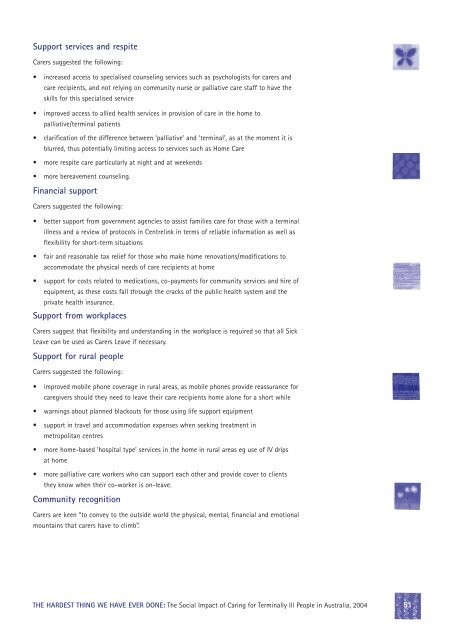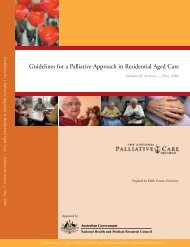The hardest thing we have ever done - Palliative Care Australia
The hardest thing we have ever done - Palliative Care Australia
The hardest thing we have ever done - Palliative Care Australia
Create successful ePaper yourself
Turn your PDF publications into a flip-book with our unique Google optimized e-Paper software.
Support services and respite<br />
<strong>Care</strong>rs suggested the following:<br />
• increased access to specialised counseling services such as psychologists for carers and<br />
care recipients, and not relying on community nurse or palliative care staff to <strong>have</strong> the<br />
skills for this specialised service<br />
• improved access to allied health services in provision of care in the home to<br />
palliative/terminal patients<br />
• clarification of the difference bet<strong>we</strong>en ‘palliative’ and ‘terminal’, as at the moment it is<br />
blurred, thus potentially limiting access to services such as Home <strong>Care</strong><br />
• more respite care particularly at night and at <strong>we</strong>ekends<br />
• more bereavement counseling.<br />
Financial support<br />
<strong>Care</strong>rs suggested the following:<br />
• better support from government agencies to assist families care for those with a terminal<br />
illness and a review of protocols in Centrelink in terms of reliable information as <strong>we</strong>ll as<br />
flexibility for short-term situations<br />
• fair and reasonable tax relief for those who make home renovations/modifications to<br />
accommodate the physical needs of care recipients at home<br />
• support for costs related to medications, co-payments for community services and hire of<br />
equipment, as these costs fall through the cracks of the public health system and the<br />
private health insurance.<br />
Support from workplaces<br />
<strong>Care</strong>rs suggest that flexibility and understanding in the workplace is required so that all Sick<br />
Leave can be used as <strong>Care</strong>rs Leave if necessary.<br />
Support for rural people<br />
<strong>Care</strong>rs suggested the following:<br />
• improved mobile phone coverage in rural areas, as mobile phones provide reassurance for<br />
caregivers should they need to leave their care recipients home alone for a short while<br />
• warnings about planned blackouts for those using life support equipment<br />
• support in travel and accommodation expenses when seeking treatment in<br />
metropolitan centres<br />
• more home-based ‘hospital type’ services in the home in rural areas eg use of IV drips<br />
at home<br />
• more palliative care workers who can support each other and provide cover to clients<br />
they know when their co-worker is on-leave.<br />
Community recognition<br />
<strong>Care</strong>rs are keen “to convey to the outside world the physical, mental, financial and emotional<br />
mountains that carers <strong>have</strong> to climb”.<br />
THE HARDEST THING WE HAVE EVER DONE: <strong>The</strong> Social Impact of Caring for Terminally Ill People in <strong>Australia</strong>, 2004<br />
51
















